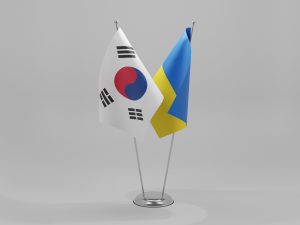Russia’s war against Ukraine is now approaching its third month. Although the war remains confined to Ukraine, the conflict carries significant implications for U.S. allies in Asia, including South Korea. As President-elect Yoon Suk-yeol enters office on May 10, the Ukraine crisis presents the Yoon government with a unique opportunity, but also some risks, in expanding its foreign policy agenda.
South Korea’s initial response to Russia’s invasion was measured relative to the United States and other close U.S. allies. The Moon Jae-in government supported international sanctions against Russia, but in contrast to Japan and Australia, it did not impose independent sanctions of its own. Members of the ruling Democratic Party of Korea even blamed Ukrainian President Volodymyr Zelenskyy for provoking Russia. After further deliberation, however, Seoul decided to ban the direct export of strategic materials to Russia and Belarus, such as semiconductors, and halted transactions with major Russian banks. Although Russia ranks only 12th among South Korea’s largest trade partners, these actions are not insignificant.
Although some policymakers and media outlets have criticized the outgoing Moon government for vacillating early on and not providing greater support to Ukraine’s defense, South Korea’s support for Ukrainian sovereignty has been welcomed and explicitly recognized by both U.S. Secretary of State Antony Blinken and President Joe Biden.
Building on existing South Korean support for Ukraine, Yoon may seek new foreign policy opportunities in three ways.
First, the Ukraine crisis allows the Yoon government to showcase early on what a “principled” foreign policy looks like – one that “advances freedom, peace, and prosperity” in defense of a liberal international order, as Yoon put it in an article for Foreign Affairs. At the United Nations, South Korea voted to condemn Russia’s invasion of Ukraine. It later voted to suspend Russia’s membership to the U.N. human rights council (UNHRC). South Korea also recently upped its pledge for humanitarian assistance to $40 million.
Moving forward, further revelations of atrocities such as executions and mass killings in cities such as Bucha and Mariupol are sure to follow. In response, South Korea has an opportunity to take a stronger stand on global democracy, human rights, and the rule of law by speaking out against potential war crimes, providing additional humanitarian aid, and accepting additional Ukrainian refugees beyond ethnic Koreans living in Ukraine.
Second, South Korea’s new government can further diversify and strengthen global partnerships with U.S. allies in Asia and Europe, shifting the narrative on South Korea’s role in the Indo-Pacific. The February 4 joint statement between Moscow and Beijing has altered the geopolitical landscape in Eurasia and has led to strengthened ties between U.S. allies in Europe and Asia. For instance, in April 2022, four U.S. Asian allies, including South Korea, officially attended a NATO foreign ministerial meeting in Brussels to discuss the Ukraine crisis. NATO has now extended an invitation to all four countries to join the upcoming NATO Summit in Madrid this June. The need to coordinate sanctions policy on Russia, in addition to addressing other geoeconomic issues such as supply chain shortages, gives the Yoon government extra incentive to cooperate with other U.S. allies and partners.
Third, the crisis provides the Yoon government greater justification for beefing up South Korean defense and deterrence. Amid the Ukraine crisis, North Korea has all the more reason to cling to nuclear weapons. North Korean provocations are likely to continue this year, thus dimming prospects for negotiations with Pyongyang anytime soon. A heightened awareness of security risks triggered by Russia’s invasion therefore offers the Yoon government greater political and diplomatic cover to strengthen its defense posture and deterrence capabilities.
Implementing a more activist foreign policy and robust defense posture does not come without risks, however. South Korean export controls and sanctions against Russia, and deepened ties to NATO will carry economic and diplomatic costs for the Yoon government. Russia has placed South Korea on its list of “unfriendly” countries. Chinese pundits have also warned Seoul that its tilt towards the U.S. and away from its more traditional stance of balancing between Beijing and Washington will end badly for South Korea. Seoul’s policymakers remember all too well the sting of China’s economic punishment for aligning with Washington too closely for Beijing’s comfort.
Steps that bolster South Korean defense capabilities and the South Korea-U.S. alliance also run the risk of pushing North Korea on the path of brinksmanship, or triggering an arms race and greater militarization and instability in Northeast Asia.
Domestically, the war in Europe will feel more distant to South Koreans relative to the European and U.S. public as evidence by poor attendance at Zelenskyy’s virtual speech to the South Korean National Assembly. As such, South Koreans may begin to question the utility of their government’s support for Ukraine should the war prolong from months to years.
Nevertheless, leveraging the Ukraine crisis to help rebrand South Korean foreign policy for a larger global role carries greater benefits than risks. Taking a stand on Ukraine and strengthening ties to like-minded countries committed to international rules and norms and democratic principles (despite those countries’ own imperfections in upholding the same norms and principles) will generate larger strategic and global reputational benefits, and enable South Korea to better withstand future economic coercion in the long term.

































